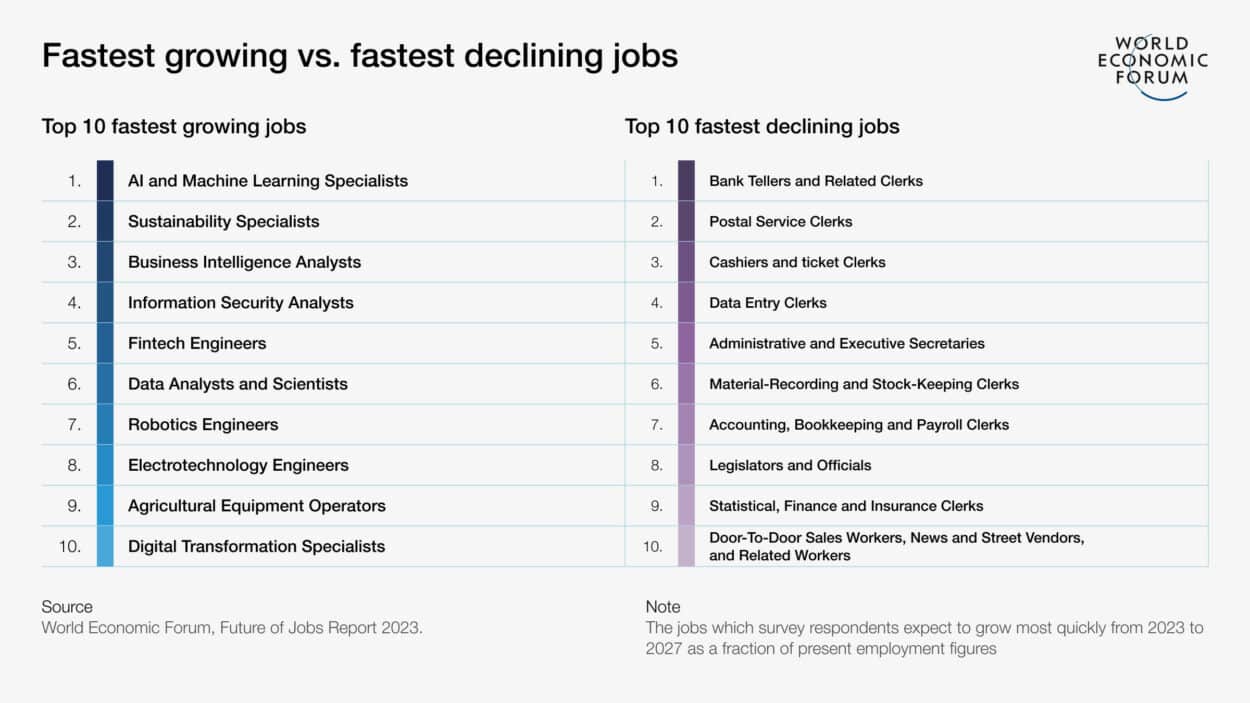In its latest report on The Future of Jobs, the World Economic Forum (WEF) predicts the creation of 69 million jobs by 2027 thanks to AI, but also the destruction of 89 million jobs. Which occupations are affected?
The introduction of powerful artificial intelligence tools like ChatGPT is expected to revolutionize the labor market in unprecedented ways. In their comprehensive analysis, the WEF explores the impact of these technologies on jobs and skills, revealing a projected net decrease of 14 million jobs, equivalent to 2% of the current employment landscape. This figure encompasses a structural job growth of 69 million jobs and a decline of 83 million jobs. The report also emphasizes the strategies businesses are likely to adopt for workforce transformation between 2023 and 2027.
To compile this data, the survey incorporates insights from 803 companies spanning 27 industry clusters and 45 economies, collectively employing over 11.3 million workers worldwide.
Key Finding #1: Technology Adoption as a Transformation Catalyst
According to the study, over the next five years, technology adoption will continue to play a pivotal role in driving business transformation. More than 85% of surveyed organizations highlight increased adoption of new and frontier technologies, as well as the expansion of digital access, as the primary trends fueling transformation within their operations.
Among these technologies, big data analytics, cloud computing, and artificial intelligence stand out as highly anticipated in terms of adoption rates. Artificial intelligence is expected to be embraced by nearly 75% of surveyed companies, with 50% foreseeing job growth as a result, while 25% anticipate job losses.
Digital platforms, apps, e-commerce, and digital trade are also set to revolutionize commerce and trade practices. Education and workforce technologies, robots, power storage technology, and distributed ledger technologies follow suit in terms of adoption priority.
Key Finding #2: Job Creation and Destruction
The overall impact of most technologies on jobs is predicted to be positive over the next five years. Notably, big data analytics, climate change and environmental management technologies, encryption, and cybersecurity are identified as the main drivers of job growth.
The AI disruption will lead to job displacement in some areas, but job growth in others will help balance the overall impact.

The Fastest-Growing Jobs
Driven by technology, digitalization, and sustainability, the fastest-growing roles are dominated by technology-related positions. AI and Machine Learning Specialists lead the pack, followed by Sustainability Specialists, Business Intelligence Analysts, and Information Security Analysts. Renewable Energy Engineers and Solar Energy Installation and System Engineers are also experiencing rapid growth due to the shift toward renewable energy sources.
The agricultural sector anticipates a 30% increase, leading to an additional 3 million jobs, particularly for Agricultural Equipment Operators. Approximately 4 million digitally-enabled roles such as E-Commerce Specialists, Digital Transformation Specialists, and Digital Marketing and Strategy Specialists are also poised for growth.
The Declining Jobs
Among the roles set to decline, the majority are influenced by advancements in technology and digitalization. Clerical and secretarial positions, including Bank Tellers and Related Clerks, Postal Service Clerks, Cashiers and Ticket Clerks, and Data Entry Clerks, are particularly vulnerable. Surveyed organizations anticipate a staggering decrease of 26 million jobs in these fields by 2027.
Key Finding #3: Essential Skills for Workers in 2023
Companies predict that 44% of workers’ skills will face disruption in the next five years. To address this challenge, the top priorities for skills training include analytical thinking, creative thinking, and proficiency in utilizing AI and big data.
Companies also plan to develop leadership abilities, and resilience, and foster a culture of lifelong learning among their workforce.
Key Finding #4: Talent Shortage Concerns
While there is optimism in nurturing existing talent within organizations, concerns persist regarding the availability of skilled professionals in the coming years. Companies encounter skills gaps and encounter challenges in attracting talented individuals.
To tackle this issue, improving talent progression and promotion processes is considered crucial. Companies will also need to develop workforce strategies such as learning and on-the-job training, as well as process automation, to achieve their business goals.









